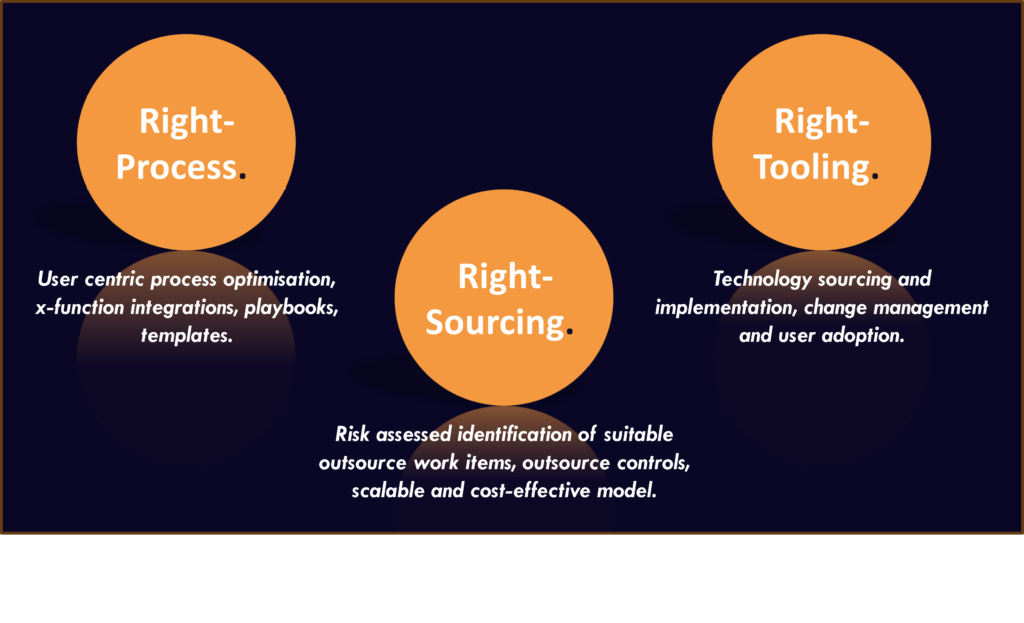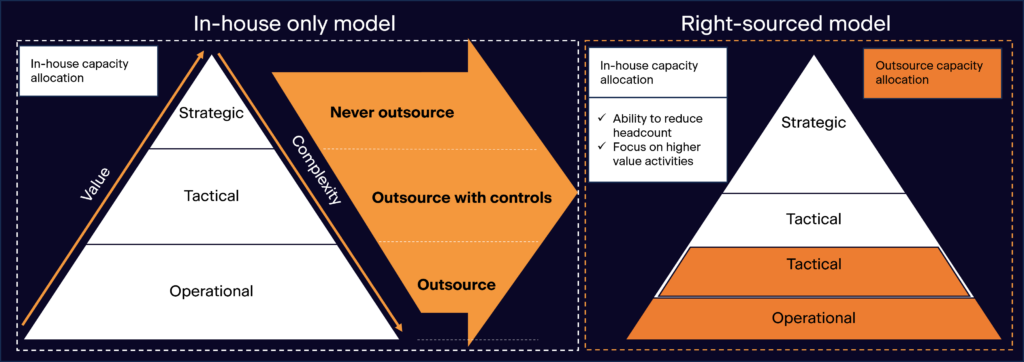In today’s fast-paced business environment, organisations are continuously seeking methods to optimise their operational efficiencies. In-house legal functions have traditionally been one of the more under-transformed areas within organisations. Legal Operations, or “Legal Ops”, however, is changing this dynamic as organisations recognise the need to manage legal functions more efficiently, align them with overall business goals, and improve the value and service provided by their legal departments. According to a 2021 survey (ACC: 2021 Chief Legal Officers Survey) over 60% of legal departments now have dedicated legal operations support, a 40% increase since 2015. This rapid adoption showcases the rising significance of Legal Ops in delivering business value.
What is Legal Ops?
Legal Ops refers to the set of business processes, technologies, and strategies designed to help legal departments run more smoothly and effectively. It involves optimising legal processes and workflows, implementing technology, optimising knowledge management, and focusing on evolving the overall business strategy within the legal framework.
The leading voice of the Legal Ops industry – Corporate Legal Operations Consortium or ‘CLOC’ – identifies 12 core competencies that legal teams should consider in their organisational efforts:
- Strategic Planning: Developing long-term strategies for the legal department aligned with the business’s needs.
- Financial Management: Budgeting, managing, and tracking spend against the budget, and financial reporting.
- Vendor Management: Managing third-party providers including law firms, alternative service providers, and legal tech vendors.
- Business Intelligence: Using data-driven insights to make decisions and predict future needs.
- Technology: Evaluating, implementing, and managing technologies that support the legal team.
- Service Delivery Models: Using resources like contract managers, paralegals, and others to efficiently manage legal work.
- Knowledge Management: Storing, retrieving, and sharing information effectively within the legal department.
- Practice Operations: Streamlining and improving processes, work allocation, and workflow.
- Project/Program Management: Design, implement, and lead department-wide and company-wide initiatives.
- Organisation Optimisation: Collaborating with other departments like finance, IT, and HR to align strategies and processes.
- Training and Development: Ensuring the legal team has the necessary skills and knowledge.
- Information Management: Ensuring effective internal and external communication strategies and tools.
The three pillars of Legal Ops
Embedding Legal Ops within your legal function can be viewed through the lens of three key pillars: Right-Process, Right-Sourcing, and Right-Tooling. These elements are critical in establishing a well-structured and efficient legal operations system.

1. Right-Process
Right-Process involves streamlining and optimising workflows and processes both within the legal department and how they integrate with other business areas. This means eliminating redundancies, reducing bottlenecks, and ensuring that the right protocols are in place. A well-defined process is key to ensuring that legal services are delivered efficiently, accurately, and in a timely manner.
Right-Process is very much a foundational pillar of Legal Ops and having in place robust workflows and processes along with well-defined and embedded templates and playbooks allows the effective implementation of right-sourcing and right-tooling strategies.
2. Right-Sourcing
Focused on leveraging the appropriate mix of in-house and external resources; this entails determining which legal services should be performed internally and which can be outsourced to external providers. Right-Sourcing helps in managing costs, improving service delivery, and enabling the legal department to focus on higher value activities.
Right-Sourcing strategies must be considered in terms of risk. This involves risk assessing the work activities across a specific legal function and identifying those that lend themselves to being outsourced. If we take for example Commercial Contracting, a risk assessment may identify contracts of a certain type (e.g. NDA’s) or under a certain value that could be outsourced, others that could be outsourced with robust controls (e.g., SLA’s / internal QC), along with high value contracts that would remain in scope for the in-house function.

Thomson Reuters Alternative Legal Services Providers 2023 Report evidences the increasing use of ALSPs by corporate legal functions as they strive for the correct mix of in-house and outsourced support. Interestingly, the report also highlights a growing use of ALSPs for legal technology consulting, leveraging ALSP knowledge of the legal tech landscape and aligning with our third legal ops pillar.
3. Right-Tooling
Right-Tooling is about equipping the legal team with the correct set of tools and technologies. This encompasses the adoption of legal technology solutions such as contract management systems, e-discovery tools, and legal research platforms, which automate routine tasks and enhance productivity.
According to Gartner’s 2021 Legal Planning & Budgeting report legal departments are planning to triple their technology budgets by 2025. The adoption of Artificial Intelligence (AI), Machine Learning (ML) and other advanced technologies can reduce the manual workload of legal teams by automating routine tasks such as document review and contract analysis, thereby enabling legal professionals to dedicate more time to strategic thinking and adding value to the organisation.
Whilst there are clear benefits of introducing Legal Tech within your legal function in terms of process efficiency and operational insights, any implementation project should be approached with a level of diligence, a focus on people and process optimisation, and with a clear change management and user adoption strategy.
Legal Ops removes the pain from in-house legal teams.
In-house legal teams often grapple with high workloads, tight budgets, and the perception or stereotype of being the ‘department of no’. Legal Ops remedies this by providing a structured approach to managing legal services.
Some key benefits of introducing Legal Ops to your legal function include:
Cost Efficiency: By optimising processes and sourcing strategies, organisations can significantly reduce legal expenses.
Enhanced Productivity: Streamlining workflows and adopting technology solutions alleviate administrative burdens, allowing legal professionals to focus on higher-value activities.
Risk Management: Improved processes and tools contribute to better compliance, risk assessment, and mitigation strategies.
Strategic Alignment: Legal Ops ensures that the legal department’s objectives are aligned with the overall business strategy, fostering organisational cohesion and success.
Operational Agility: Identification of operational, process and resource issues through data insights, enabling legal functions to make informed and proactive changes.
In conclusion, Legal Ops is a crucial element for organisations aiming to optimise their legal functions. By focusing on the pillars of Right-Process, Right-Sourcing, and Right-Tooling, Legal Ops fosters efficiency, cost reduction, and strategic alignment. The integration of technology and AI further propels the transformation of legal services, making Legal Ops a game-changer in removing the pain from in-house legal.
About Johnson Hana
Johnson Hana is Ireland’s leading alternative legal solutions provider. That means we disaggregate legal advisory and legal process work, and focus on the latter.
We offer:
Legal Process Outsourcing – whereby a specific legal process is carved out and outsourced to us
Legal Process Secondments – to augment a busy legal team or fulfil a temporary requirement for an experienced legal professional.
Historically, legal advisory and legal process work were tackled and billed in the same way. This means that all legal work has been as costly and time consuming as legal advice.
It doesn’t need to be.
We deliver legal process work through a combination of innovative legal technologies, robust project management methodologies, and expert lawyers. This approach reduces client legal spend by over 50%, while also providing totally transparent reporting and billing. This leaves our clients free to focus on the strategic, advisory work that really adds value.
